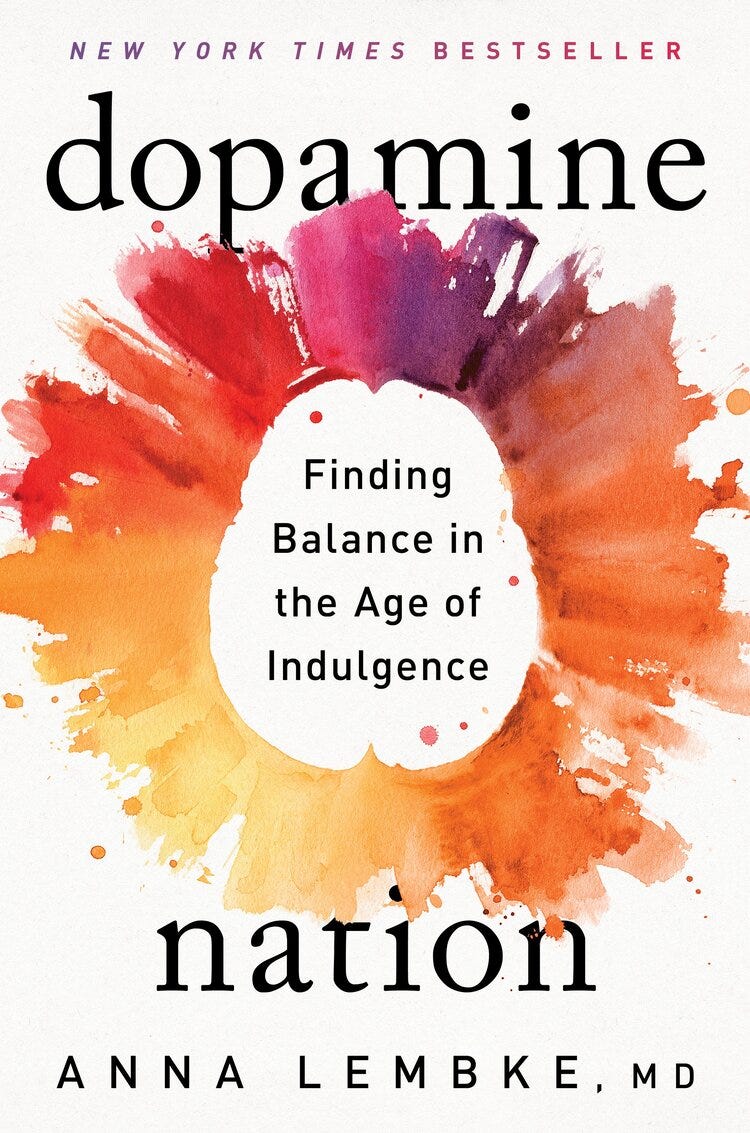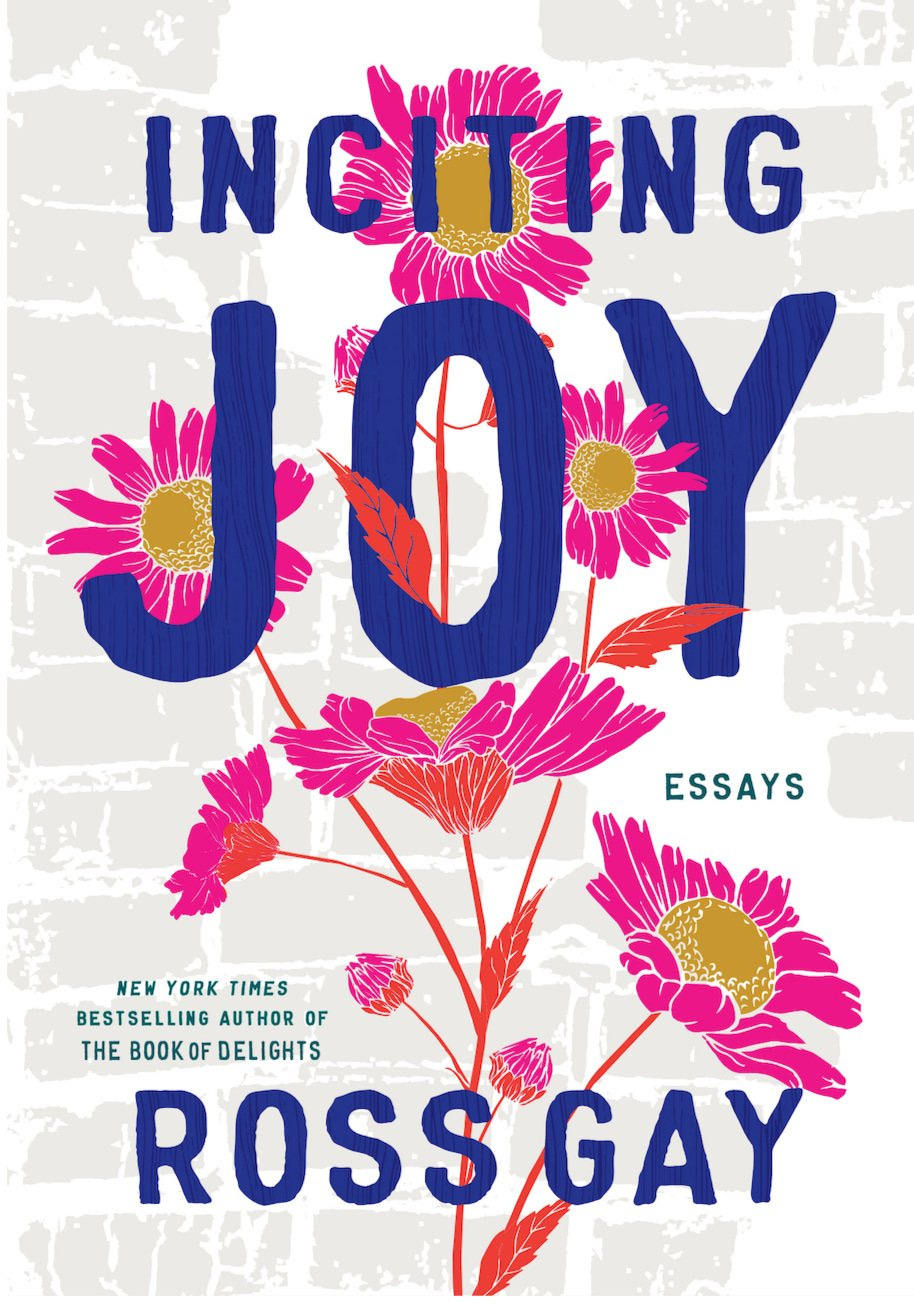Here’s a rundown of the last three nonfiction books I’ve read12 and how they are in conversation with each other in the squirrel’s nest I call my brain. This is not meant to be super comprehensive reviews of the books, just the stuff from them that have floated to the surface (of the aforementioned squirrel’s nest).
Dopamine Nation: Finding Balance in the Age of Indulgence.
This book is written by psychiatrist Anna Lembke and she goes through case studies of clients of hers over the years and how their very different addictions share several commonalities - the biggest one being our bottomless need for dopamine.
One of her clients was someone who became addicted to ice baths and the way it made them feel the same as they did when on coke, but the feeling lasted longer. In this section, Lembke discusses how for many people, our relationship to pain has been fundamentally altered by modern life. The wild versions of ourselves didn’t need to manufacture scenarios that released dopamine since they were constantly being chewed on by neolithic cheetahs. I’m paraphrasing. Now, pain is avoided at all costs, which is fine, except when one of those costs is our own internal hormone regulation. So her client devised more and more elaborate ways to work ice baths into his home and social life until he realized that what he thought he had done to supplant his drug addictions had actually become a new one, to an extent.
Taking perhaps the wrong message from this section, I spent half of this year only taking coldass, heatless showers. It sucked while it was happening, but like the ice addict taught me, you can get through it because you know it’s over soon. And then… I am always bad at knowing what my body is actually feeling, and maybe it was just placebo, but I did feel pretty good afterward! And once the leaves started changing colors I was out — back to hot water, lord bless it.
Another client of hers, when trying to quit drinking, instead of getting rid of ALL the alcohol in their house, they kept one beer in the fridge. That way, they got to actively make the CHOICE not to drink instead of just trying to avoid the thing entirely. I know this wouldn’t work for everyone, but the logic of this makes sense to me. It’s one of those things that, on the surface, looks ridiculous, but emotionally (dopamineally?) it seems like an obvious solution.
I’m still ruminating on the book and how it applies to my life but here are some useful takeaways for me:
When viewing addiction through the lens of dopamine, we are able to see what binds so many of us together and how we can possibly manage our dopamine so it has less and less of a negative impact on ourselves or others. It also might help to extend grace to people regardless of their addiction.
To that point, Lembke weaves throughout the narrative how she struggled with addiction to reading trashy drugstore romance novels. If the book was only a memoir about that, I might not think she was a very serious person. But in relation to the larger points she makes about our need for short bursts of good feeling, it makes total sense and can be just as disruptive as other more conventionally understood/accepted addictions.
When trying to quit something, she recommends going cold turkey for a month (again, knowing there is an endpoint helps you through the harder times). Then at the end of the month, assess everything you noticed about yourself. Even if you start up using again, you have lots of useful data about yourself to process.
Conflict is Not Abuse: Overstating Harm, Community Responsibility, and the Duty of Repair.
Written by Sarah Schulman, this book was recommended to me by my therapist because of the way I frame the harm I have caused (directly and indirectly, to others and myself) in my life. Schulman writes fiction and nonfiction, and this book draws from her own life (as a queer, Jewish writer) and how she navigates her responses to small and large disputes (from ghosting behavior to physical altercations to the evolution of queer family dynamics to the 2014 war between Israel and Hamas).
One of the ways she establishes her thesis is juxtaposing how she (and others) differentiate conflict and abuse. Abuse is often systematic, manipulative, unsafe - eg stalking, bullying, ongoing physical harm. Conflict is often one-time and/or between incompatible parties and/or rooted in histories unseen - eg misunderstandings, disagreements, errors in judgment. Generally, and I am certain I am getting some of nuance in Schulman’s argument wrong here, it is the difference between interactions between bad faith and good faith actors (although many good faith actors might be acting from a place of faulty/manipulated logic and can still cause real harm).
For her, the ramifications for conflating conflict with abuse are manifold. One is that you delegitimize or muddy the waters of actual abuse. Another is that you allow what could be a very resolvable conflict occupy too much emotional energy just because you are afraid of facing it head on. This means you spend more time feeling bad than if you had just confronted your own discomfort head on.
Schulman has to thread the needle constantly through what appropriate responses to harm might be.
Major takeaways for me from this are:
If you have a disagreement, talking face-to-face or at least voice-to-voice is vital when working through it. Text, email, social media (dear god), or silence are all places where escalation of hurt can (unintentionally) occur. Some people she knows will only speak with someone who has harmed them through an impartial third party, or, if the harmful person is an addict, only after they have been clean for at least a year.
Don’t call the cops to settle quarrels. You are involving the State in a disagreement where it does not and will not ever know the full story (and will often side with the person in the disagreement for whom the State has been built to serve best: the rich, the powerful, the white, the men).
Communities/families can often give bad, escalatory advice. Be critical of people who encourage extreme reactions to others - they don’t have to deal directly with the fallout and they might just be relishing the spectacle.
Any argument that presupposes the continued occupation of Palestinians by Israel is built on unjust ground and is a nonstarter.
Ross Gay is one of my favorite poets, despite my jealousy of his ability to write about plants and gardening in the kind of urgent/necessary(needful)/surprising way that I can only dream of.
This book makes the case for identifying the big joys in your life and relishing them as a sort of mindfulness practice. As is stated early and often, joy is impossible without sorrow and when you think through the prolonged joys of your life, sorrow will inevitably be invited to the party too. Get to know them.
Like the previous two authors, Gay applies his method of viewing the world to his own life and experiences - and each joy he incites (that is how the essays are organized) has at least one if not many complementary sorrows.
Here are some useful pieces for me:
There is no limit to the things that can bring you joy, no bottom to the joy you can feel for them. Collect them. Name them.
Food should be freely and equally shared, preferably at a potluck.
When we act in ways that baffle our loved ones (or ourselves), the source of this behavior can often, eventually, be found, sometimes in surprising places.
Losing your phone (intentionally or otherwise) can lead to memorable adventures.
All three of these books offer much much more than I am communicating here. All of them remind me of Book IV of Gulliver’s Travels where Gulliver meets the horse-like creatures called the Houyhnhnms and the human-like animals the Yahoos. As my 18th century British lit teacher relayed to me - Swift was responding to the idea that humans were “rational animals” and every other creature was irrational, without reason.
So the Houyhnhnms live in a society ruled by pure, methodical logic, and they are deeply annoyed with the Yahoos and all their shit-flinging hedonism. At one point, the horseys posit that the Yahoos are the source of so much trouble that exterminating them is a legitimate response to their nuisance. Genocide can come from all kinds of logical reasoning. What about the hostages? What about defending themselves from future attacks?
Obviously, we are neither Yahoo or Houyhnhnm (I can tell you how I pronounce it but you can make up your own pronunciation, they’re not real so you won’t offend them!). For Swift, humans are capable of logic, but there’s other things that make up who we are. Feelings and instincts and whims and free will. It feels like the older I get the more I understand about humans and that’s not always enjoyable. But maybe it means that certain behaviors surprise me less, despite their brutality or self-destructiveness.
Gay relays in the book a time when he was doing a poetry reading and a white woman asks, rhetorically, “how can black people write about flowers at a time like this?” Maybe you can come up with your own answers to that question. There are many.
“Read” means I have read most of them.
“Read” also applies to audiobooks - which in the case of the Schulman and Gay books are read by the authors and are unique and compelling documents separate from their textual counterparts. Also I still call audiobooks “books on tape” because I am from a different era that had mercury thermometers and television channels that would be sent through the sky to your house and into two metal fishing poles on top of your TV.






